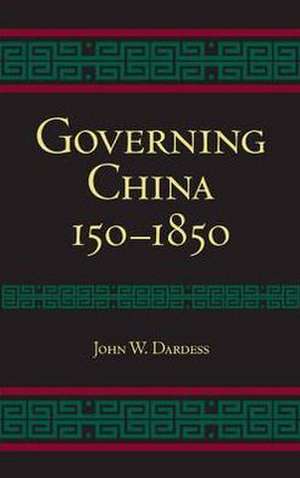Governing China: 150-1850
Autor John W. Dardessen Limba Engleză Hardback – 15 sep 2010
Preț: 288.14 lei
Preț vechi: 317.59 lei
-9% Nou
Puncte Express: 432
Preț estimativ în valută:
55.15€ • 57.48$ • 45.91£
55.15€ • 57.48$ • 45.91£
Carte disponibilă
Livrare economică 16-30 decembrie
Preluare comenzi: 021 569.72.76
Specificații
ISBN-13: 9781603843126
ISBN-10: 1603843124
Pagini: 139
Ilustrații: maps
Dimensiuni: 9 x 215 x 13 mm
Greutate: 0.28 kg
Editura: Hackett Publishing Company
Colecția Hackett Publishing Company, Inc (US)
ISBN-10: 1603843124
Pagini: 139
Ilustrații: maps
Dimensiuni: 9 x 215 x 13 mm
Greutate: 0.28 kg
Editura: Hackett Publishing Company
Colecția Hackett Publishing Company, Inc (US)
Recenzii
"This compact narrative history of government institutions and their dialectical relation to society makes a perfect introduction to traditional China for political science, modern history, and comparative politics classes. The thesis, upheld by both specifics in lively prose and thought-provoking cross-period comparisons, is that unity, however valorized, always required hard work: military, political, and cultural creativity amidst ever-changing ethnic, class, and religious formations. Dardess also washes out old libels on non-Han, female, and eunuch power holders simply by recounting the facts." -- S Schneewind, University of California, San Diego
John Dardess has provided a concise yet rich description of the evolution of the governing institutions of imperial China through periods of unity and disunity from the late Han (150 CE) to the late Qing (1850) dynasties. His account of change and continuity in governance over a two-thousand-year span of China's history is an excellent and accessible introduction to a remarkably durable political tradition that resonates even today in the workings of the modern Chinese state and contemporary state-society relations. --William Joseph, Wellesley College
John Dardess has provided a concise yet rich description of the evolution of the governing institutions of imperial China through periods of unity and disunity from the late Han (150 CE) to the late Qing (1850) dynasties. His account of change and continuity in governance over a two-thousand-year span of China's history is an excellent and accessible introduction to a remarkably durable political tradition that resonates even today in the workings of the modern Chinese state and contemporary state-society relations. --William Joseph, Wellesley College
